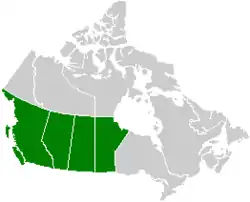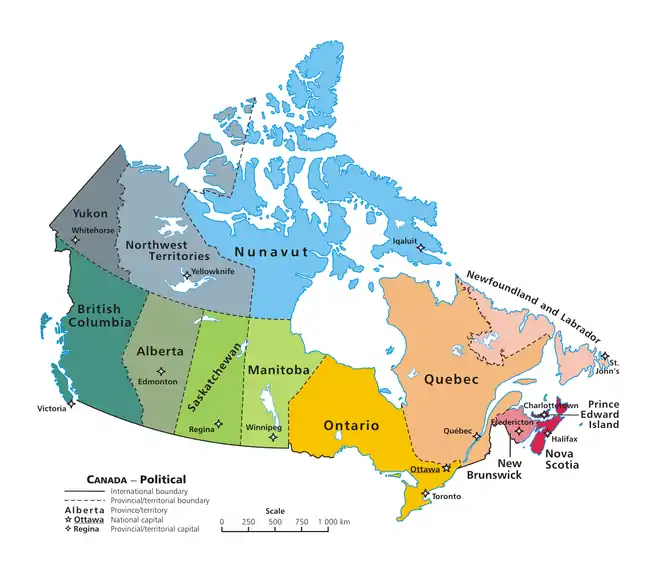Western alienation
Western alienation, in the context of Canadian politics, refers to the notion that the Western provinces (British Columbia, Alberta, Saskatchewan and Manitoba) have been marginalized in favour of Ontario and Quebec. Those who ascribe to the sentiment believe that the latter provinces are politically over-represented and economically favoured at the expense of western Canadians.[1]

| This article is part of a series on |
| Conservatism in Canada |
|---|
 |
|
|

According to analysis by Global News, Western alienation is considered especially potent in Albertan and Saskatchewanian politics.[2] A 2019 poll by Ipsos found a historically high level of support for secession from Canada in both Alberta and Saskatchewan.[3][4]
History of alienation
Following Confederation in 1867, the first Canadian Prime Minister, Sir John A. Macdonald, announced a "National Policy" to "broaden the base of the Canadian economy and restore the confidence of Canadians in the development of their country".[5]
The November 1974 Canadian federal budget terminated the deduction of provincial natural resources royalties from federal tax. According to Roy Romanow, this move kicked off the "resource war", a confrontation between Pierre Trudeau's federal government and the prairie Provinces over the control and revenues from natural resources extraction and energy production.[6]
Following a rapid increase in the price of oil between 1979 and 1980, the government of Prime Minister Pierre Trudeau introduced the National Energy Program (NEP), which intended to increase Canadian ownership in the oil industry, increase Canada's oil self-sufficiency and redistribute the wealth generated by oil production towards the federal government.[7] The program was extremely unpopular in the west,[7] where most of Canada's oil is produced, due to the perception that the national government was implementing unfair revenue sharing.[8]
Current factors of alienation
Political factors
A source of Western irritation can be traced to the Quebec sovereignty movement. Some Western Canadians argue that Quebec receives undue attention from the rest of the country due to concerns about its desire to secede from Canada or obtain sovereignty-association.[9]
Economic factors
In 2005, Alberta's share of equalization payments was calculated to be approximately $1.1 billion,[10] less than what was provided, but significantly higher on a per capita basis than Ontario. Equalization payments are made by the federal government to the "have-not" provinces. Unlike social and health transfers, there are no restrictions over how this money is spent at the provincial level. In 2009–2010, Quebec received $8.552 billion,[11] making it the single largest beneficiary, as it has been throughout the program's history. In the 2009–2010 fiscal year, Ontario received an equalization payment of $347 million,[11]
British Columbia was a "have-not" province for just over five years, ending in 2006 and 2007, when it received $459 million.[11]
References
- "Western Canadians still feel more connected to their province than to country as a whole: Ipsos - Globalnews.ca". globalnews.ca. October 8, 2018.
- Sorensen, Eric (August 25, 2019). "Analysis: Western alienation is very real in Alberta and Saskatchewan | Globalnews.ca". Global News. Retrieved March 15, 2023.
- Maryam, Shah (November 6, 2019). "Separatist sentiment in Alberta, Saskatchewan at 'historic' highs: Ipsos poll". Global News. Retrieved November 9, 2019.
- "Ipsos poll on Western separation records historic highs". Global News. November 6, 2019. Retrieved November 6, 2019.
- Brown, Robert Craig. "National Policy". The Canadian Encyclopedia. Archived from the original on January 29, 2012. Retrieved February 9, 2012.
- Back to Blakeney : revitalizing the democratic state. McGrane, David,, Romanow, Roy J.,, Whyte, John D.,, Isinger, Russell, 1965-. Regina, Saskatchewan, Canada. August 24, 2019. ISBN 978-0-88977-641-8. OCLC 1090178443.
{{cite book}}: CS1 maint: location missing publisher (link) CS1 maint: others (link) - Bregha, Francois. "National Energy Program". The Canadian Encyclopedia. Archived from the original on January 5, 2013. Retrieved February 9, 2012.
- "Canadian Energy Overview 2010 – Energy Briefing Note". National Energy Board. Archived from the original on January 1, 2013. Retrieved February 9, 2012.
- "Alienating the west". December 1, 2005 – via The Economist.
- Bouquets of Gray: Equalization math. Bouquetsofgray.blogspot.com (July 18, 2005).
- "Federal Support to Quebec". Department of Finance Canada. Retrieved May 14, 2011.
Further reading
- Braid, Don (1990). Breakup: why the West feels left out of Canada. Toronto: Key Porter Books. ISBN 978-1-55013-256-4.
- Melnyk, George (1993). Beyond alienation: political essays on the West. Calgary: Detselig Enterprises. ISBN 978-1-55059-060-9.
- Young, Lisa; Archer, Keith, eds. (2002). Regionalism and party politics in Canada. Don Mills, Ont.: Oxford University Press. ISBN 978-0-19-541599-5.